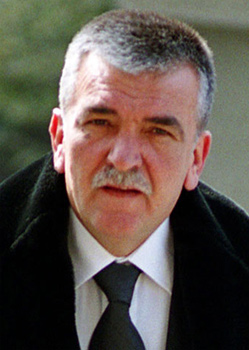Zoran Žižić facts for kids
Quick facts for kids
Zoran Žižić
|
|
|---|---|
|
Зоран Жижић
|
|
 |
|
| 4th Prime Minister of the Federal Republic of Yugoslavia | |
| In office 4 November 2000 – 24 July 2001 |
|
| President | Vojislav Koštunica |
| Preceded by | Momir Bulatović |
| Succeeded by | Dragiša Pešić |
| Deputy Prime Minister of Montenegro | |
| In office 15 February 1991 – 24 December 1996 |
|
| Prime Minister | Milo Đukanović |
| Personal details | |
| Born | 4 March 1951 Titograd, PR Montenegro, FPR Yugoslavia |
| Died | 4 January 2013 (aged 61) Podgorica, Montenegro |
| Nationality | Serb |
| Political party | Democratic Party of Socialists (1991–1998) Socialist People's Party of Montenegro (1998–2005) Democratic Party of Unity (2006–2013) |
Zoran Žižić was an important politician from Yugoslavia and Montenegro. He was born on March 4, 1951, and passed away on January 4, 2013.
He served as a top government official, called Deputy Prime Minister, in Montenegro from 1991 to 1996. Later, he became the first Prime Minister of the Federal Republic of Yugoslavia in 2000. This happened after a big political change in the country.
Žižić resigned from his role as Prime Minister in 2001. He did this to protest a decision to send Slobodan Milošević to a special court. He was a member of the Socialist People's Party of Montenegro. He was later removed from this party in 2005 because of disagreements.
Early Life and Education
Zoran Žižić was born in a city then called Titograd on March 4, 1951. This city is now known as Podgorica, the capital of Montenegro.
His father, Živko Žižić, was a fighter in World War II. After the war, his father held several important government jobs. These included State Prosecutor and Minister of Education and Justice in Montenegro.
Zoran went to elementary school and high school in his hometown. He then studied law at the University of Belgrade. After finishing his studies, he returned to Titograd. He worked as a lecturer at the University of Montenegro Faculty of Law.
Political Journey
Zoran Žižić started his political career as a member of the League of Communists of Yugoslavia. He became more active in politics around 1989. He was chosen to lead a main committee of the Democratic Party of Socialists (DPS). He also became a member of the Federal Assembly.
His first elected government job was Deputy Prime Minister of Montenegro. He held this position for several years, from 1991 to 1996. During this time, he worked on plans to make Montenegro a financial hub.
In 1998, Žižić joined a new political party called the Socialist People's Party of Montenegro (SNP). He became the Vice President of this party. On November 4, 2000, he became the Prime Minister of the Federal Republic of Yugoslavia. This was a very important role.
Žižić resigned from being Prime Minister on June 29, 2001. He left his position to show his disagreement with a decision to send Slobodan Milošević to a court in another country. He officially left office on July 24, 2001.
After 2001, Žižić had disagreements with the leaders of his party, the SNP. In 2005, he helped start a new group called the Movement for the Joint European State Union of Serbia and Montenegro. This group wanted Serbia and Montenegro to stay united. Because of these disagreements, he was removed from the SNP in April 2005.
In July 2006, Žižić formed his own political party, the Democratic Party of Unity. He was the president of this new party. His party joined other political groups in Montenegro.
Family and Passing
Zoran Žižić was married to Mira Žižić. They had two children together, a daughter named Sonja and a son named Vuk.
Zoran Žižić passed away on January 4, 2013, after a medical operation. He was 61 years old. His funeral was held in Podgorica. The Prime Minister of Serbia, Ivica Dačić, attended his funeral.
 | Stephanie Wilson |
 | Charles Bolden |
 | Ronald McNair |
 | Frederick D. Gregory |

